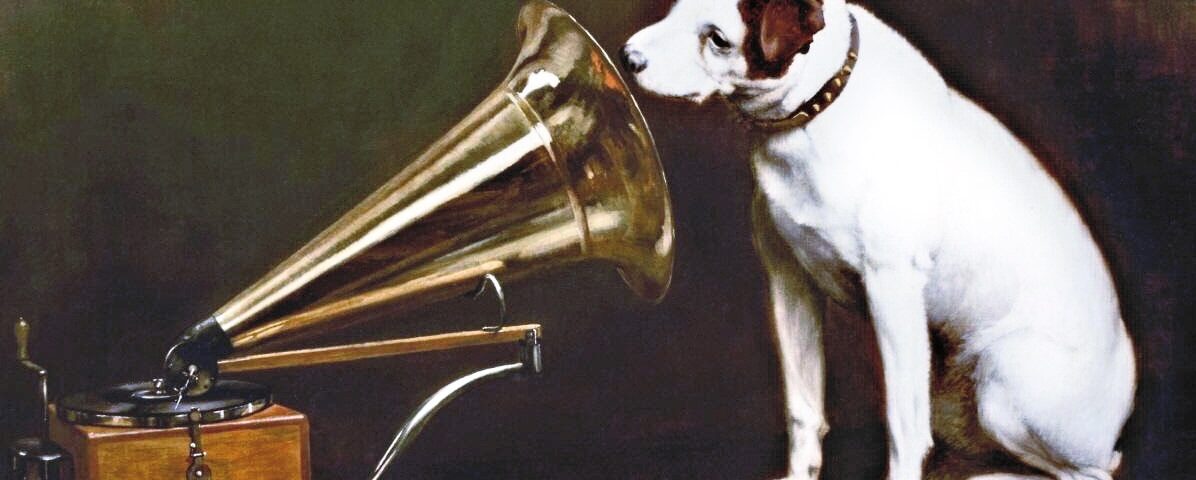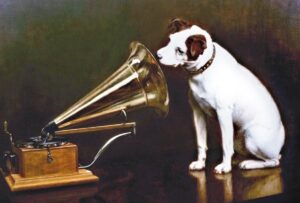Pesach and Our Master’s Voice

 “The dogs who have owned me” – I read this phrase in a newspaper article a couple of years back. It’s both odd and adept. Isn’t a dog’s owner its “master”? Yet, pet ownership does demand a great deal of the human “masters.” It is the human who must look after the canine’s needs. The article’s author described how his relationship with his dogs has changed him as a person. His argument might be extended beyond pets. In some ways, whenever we own something, we ourselves are owned – and likewise changed. As the Talmud (Kiddushin 20a) writes: “Anyone who acquires a … slave is considered like one who acquires a master for himself.”
“The dogs who have owned me” – I read this phrase in a newspaper article a couple of years back. It’s both odd and adept. Isn’t a dog’s owner its “master”? Yet, pet ownership does demand a great deal of the human “masters.” It is the human who must look after the canine’s needs. The article’s author described how his relationship with his dogs has changed him as a person. His argument might be extended beyond pets. In some ways, whenever we own something, we ourselves are owned – and likewise changed. As the Talmud (Kiddushin 20a) writes: “Anyone who acquires a … slave is considered like one who acquires a master for himself.”
In his book Sapiens, Yuval Noah Harari makes a shocking claim about the human connection to the wheat plant. He suggests that as a species, humans have not domesticated wheat so much as wheat has domesticated us. Harari asks us to consider the position of wheat thousands of years ago when it was just one of many wild grasses, confined to a small part of the Middle East:
Suddenly, within just a few short millennia, it was growing all over the world. According to the basic evolutionary criteria of survival and reproduction, wheat has become one of the most successful plants in the history of the earth. Worldwide, wheat covers about 2.25 million square kilometers of the globe’s surface, almost 10 times the size of Britain. How did this grass turn from insignificant to ubiquitous?
Harari argues that wheat manipulated us. Up until the adoption of wheat as a staple crop, humans had lived quite comfortably as hunter-gatherers. Our symbiotic relationships with the wheat species changed everything. “Within a couple of millennia, humans in many parts of the world were doing little from dawn to dusk other than taking care of wheat plants. It wasn’t easy. Wheat demanded a lot of them. Wheat didn’t like rocks and pebbles, so Sapiens broke their backs clearing fields. Wheat didn’t like sharing its dirt, water and nutrients with other plants, so men and women labored long days weeding under the scorching sun.”
Ever year at Pesach, the relationship between humans and wheat dominates our thinking about slavery and freedom. (This year, with Russia’s attack on Ukraine, we worry of potential famine, as collectively Russia and Ukraine produce a quarter of global wheat exports.) Egypt was the breadbasket of the ancient world; it is not by chance that Pharaoh dreamed of seven stalks of wheat. When we left Egypt, we did not simply throw off the yoke of the Egyptians; we rethought our relationship with the species that “domesticated us.” To commemorate that moment every year, we discard all the wheat (and the other four classic species of grain) that has not been prepared as matza. For the duration of the holiday, we declare our dominion over “our owner,” by controlling wheat consumption in a radical way. Symbolically, we retake control of our wheat relationship.
Today, it’s not just wheat that enslaves us. Many things that we own make demands of us. If we are not careful, they too can usurp our freedom. Every year, the electronic devices that we carry occupy more and more of our time. To adapt Harari’s quote regarding wheat, “Within [far less time than] a couple of millennia, humans in many parts of the world [are] doing little from dawn to dusk other than [engaging with screens].”
Perhaps, the complexity of such material relationships might explain another detail of our Pesach story – returning us to the dogs with which we began. Dogs make a number of appearances in the traditions surrounding Pesach. Dogs are the benchmark in rabbinic literature for defining what chametz is inedible and therefore not prohibited.
Likewise, Rashi (Exodus 22:30) quoting Mekhilta de-R. Yishmael writes
God does not withhold the reward due to any of His creatures. The dog is entitled to reward because it is stated “But against the children of Israel shall not a dog move its tongue” (Exodus 11:7), and this happened. The Holy One, blessed be He, said: Give it the reward it deserves [by giving it the meat unfit for kosher consumption].
As newly formed “masters,” we conduct ourselves with an attitude that recognize the responsibility that comes with freedom. Our relationships – with our pets, our food, and our technology – do not flow in one direction alone. With freedom and mastery comes responsibility.
In every generation, we must ask ourselves, “What do I own, and what has owned me?”
Chaim Strauchler, associate editor of TRADITION, serves as rabbi of Rinat Yisrael in Teaneck.
